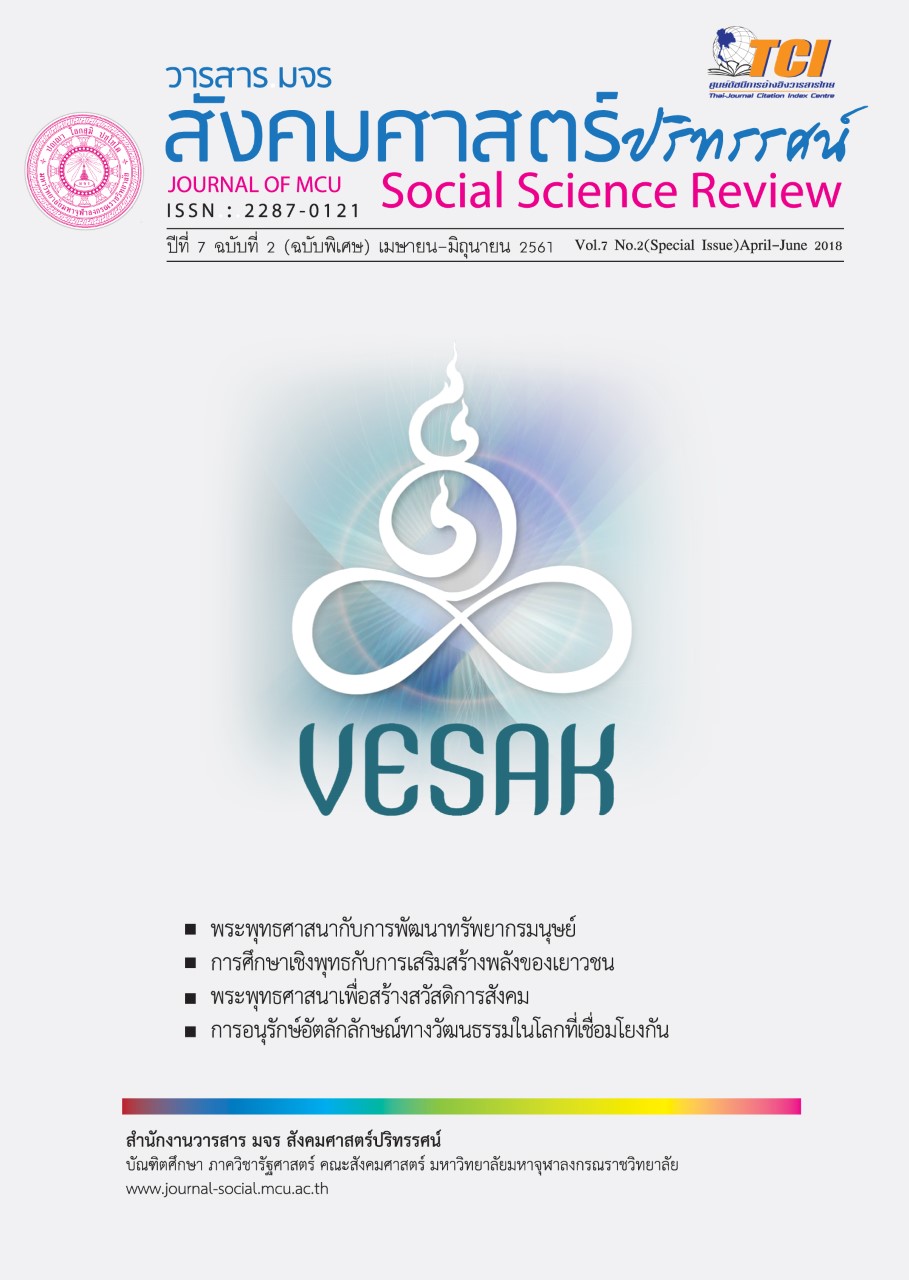วัฒนธรรมทางการเมืองของไทยกับการพัฒนาประชาธิปไตยเชิงพุทธ
บทคัดย่อ
บทความวิชาการนี้มีวัตถุประสงค์เพื่อเสนอแนวคิดวัฒนธรรมทางการเมืองของไทยกับแนวทางการพัฒนาประชาธิปไตยเชิงพุทธ วัฒนธรรมทางการเมืองเป็นแบบแผนของทัศนคติ พฤติกรรมของบุคคลต่อระบบการเมืองที่เกิดจากการเรียนรู้ ความเชื่อ ค่านิยม และการกล่อมเกลาทางการเมืองจากสถาบันต่างๆ ทางสังคม เช่น สถาบันครอบครัว การศึกษา ศาสนา สื่อมวลชน และสถาบันการเมืองการปกครอง เป็นต้น การพัฒนาประชาธิปไตยจะพัฒนาที่วัฒนธรรมทางการเมืองของคนไทยให้เกิดความเชื่อมั่น ศรัทธา ในหลักความเสมอภาค และเสรีภาพ การเคารพในกติกาของการปกครองระบอบประชาธิปไตย โดยการมีส่วนร่วมในกิจกรรมทางการเมือง รู้และเข้าใจอย่างมีเหตุและผลในทางสร้างสรรค์ ประชาธิปไตย คือ สิทธิ (ไม่ใช่หน้าที่) และเสรีภาพ (ไม่ใช่เบียดเบียน) ที่มีขอบเขต ผู้นำต้องยึดหลักนิติธรรม และต้องสร้างธรรมาธิปไตยในสังคม เพื่อพัฒนาประชาธิปไตยให้เป็นธรรมและมีธรรม ให้สอดคล้องกับวิถีชีวิต วัฒนธรรม สังคม และการเมืองไทย ที่เป็นเมืองพุทธ
เอกสารอ้างอิง
Tinnapan Nakata, Democracy: Meaning, Factors Supporting and Conscience Creation, Bangkok: Bumrungmeuang, 2547.
Bookori Yihama, Introduction to Political Sciences, Bangkok: Lada, 2550.
Polsak Jirakraisiri, Thai Poltical Culture, Bangkok: Saengrueng Press, 2524.
Air Marshall Pongsatorn Chaisen, Secure and Sustainable Democracy Development, Training Curriculum for the Rules of Laws for Democracy, Office of the Constitution Court, 2558.
Air Marshall Pongsatorn Chaisen, Secure and Sustainable Democracy Development, Training Report of Curriculum for the Rules of Laws for Democracy, Office of the Constitution Court, 2558.
Associate Profressor Dr.Supot Boonviset and Praiwan Kenprom, Dhammadhipateyya and Democracy in Thailand’s Context, Journal of Politics, Administration and Laws, Vol.6, No.3(2014), September- December, 2557: 45-31.
Ruengvit Kasemsuwan, Political Science Principles, Bangkok: Bopit Press, 2551.
Vichai Tansiri, Political Culture, Bangkok: Sukum and Son, 2551.
Sombat Dhamrongtanyawong, Political Culture of Agricultural Leaders in Central Region, Master Degree Thesis, Government, Faculty of Political Science, Graduate School, Chulalongkorn University, 2520.
Sangworn Limpatapanlop, Dhammadhitpateyya and Democracy in the Thailand’s Context, Training Report of Curriculum for The Rules of Laws for Democracy, Office of the Constitution Court, 2559.
Sanya Sanyavivat, Political Sociology, 2nd ed. Bangkok: Chaopraya Press, 2532.
Office of Public Relations, office of the Secretariat, the House of Representatives, Political Culture, Bangkok: Office of the Secretariat, House of Representatives Press, 2554.
Amara Pongsapit, Man and Culture, in Society and Culture, Bangkok: Chulalongkorn Press, 2551.
Gabriel A. Almond and G. Bingkorn Powell, Jr., Comparative Politics: A Development Approach, the Journal of Politics 29, n0.4 (Nov.1976): 903-905.
ดาวน์โหลด
เผยแพร่แล้ว
รูปแบบการอ้างอิง
ฉบับ
ประเภทบทความ
สัญญาอนุญาต
ลิขสิทธิ์ (c) 2020 วารสาร มจร สังคมศาสตร์ปริทรรศน์

อนุญาตภายใต้เงื่อนไข Creative Commons Attribution-NonCommercial-NoDerivatives 4.0 International License.
เพื่อให้เป็นไปตามกฎหมายลิขสิทธิ์ ผู้นิพนธ์ทุกท่านต้องลงลายมือชื่อในแบบฟอร์มใบมอบลิขสิทธิ์บทความให้แก่วารสารฯ พร้อมกับบทความต้นฉบับที่ได้แก้ไขครั้งสุดท้าย นอกจากนี้ ผู้นิพนธ์ทุกท่านต้องยืนยันว่าบทความต้นฉบับที่ส่งมาตีพิมพ์นั้น ได้ส่งมาตีพิมพ์เฉพาะในวารสาร มจร สังคมศาสตร์ปริทรรศน์ เพียงแห่งเดียวเท่านั้น หากมีการใช้ภาพหรือตารางหรือเนื้อหาอื่นๆ ของผู้นิพนธ์อื่นที่ปรากฏในสิ่งตีพิมพ์อื่นมาแล้ว ผู้นิพนธ์ต้องขออนุญาตเจ้าของลิขสิทธิ์ก่อน พร้อมทั้งแสดงหนังสือที่ได้รับการยินยอมต่อบรรณาธิการ ก่อนที่บทความจะได้รับการตีพิมพ์ หากไม่เป็นไปตามข้อกำหนดเบื้องต้น ทางวารสารจะถอดบทความของท่านออกโดยไม่มีข้อยกเว้นใดๆ ทั้งสิ้น





